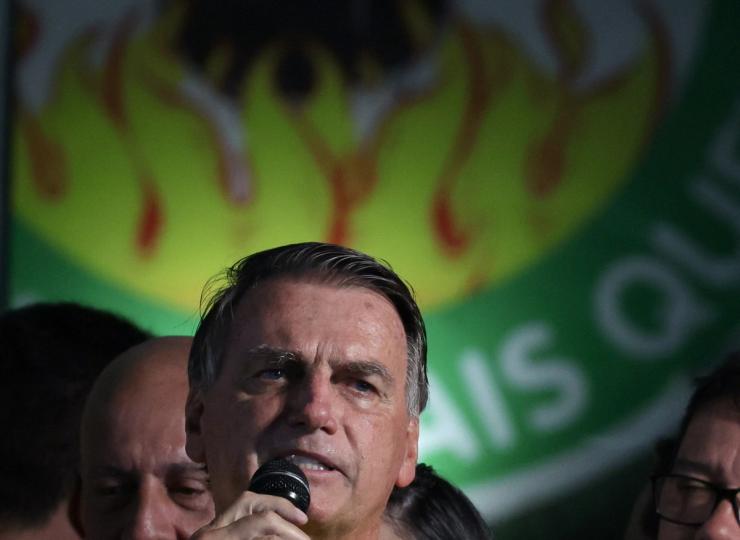The News
Former Brazilian President Jair Bolsonaro hid for two nights at the Hungarian embassy in Brasília after prosecutors seized his passport during a criminal investigation into his attempts to overturn the 2022 presidential election, according to a New York Times investigation.
Days after two of the former president’s aides were arrested and as investigators appeared to be closing in, Bolsonaro entered the embassy on February 12 in “an apparent bid for asylum,” the paper said citing security camera footage, adding that “it is unclear why he left.”
Bolsonaro confirmed his stay at the embassy, telling Brazil’s Metrópoles news site: “I won’t deny that I was in the embassy … I won’t say where else I’ve been. I have a circle of friends with some heads of state around the world. They are worried. I talk to them about matters in our country’s interest. Full stop. The rest is speculation.”
Brazilian investigators would not have the power to arrest the former president inside an embassy, as they are legally off-limits to the authorities.
Bolsonaro has long considered Hungary’s fellow far-right leader, Prime Minister Viktor Orbán, a key European ally.
His lawyers later said he was at the embassy to speak with “numerous authorities of the friendly country” and denied the visit was related to the investigation, Bloomberg reported.
Brazil’s former president, who faces a string of criminal investigations — said prior to his election defeat in 2022 that he saw only three possible futures for himself: prison, death or victory.
SIGNALS
Will embassy stay lead to Bolsonaro’s arrest?
Bolsonaro’s apparent decision to hide out at the Hungarian embassy following his passport seizure could, “in theory, precipitate a preventive arrest of the former president” if courts agree that he is actively attempting to evade legal proceedings, journalist Vera Magalhães wrote for O Globo. However, Magalhães said it is “unlikely” for the Supreme Federal Court Justice overseeing Bolsonaro’s election subversion case to adopt “more severe measures” at this time. The judge, Alexandre de Moraes, has worked hard to brand himself as an impartial judge immune from Bolsonaro and his supporters’ conspiracy attacks over him being unfairly prosecuted, she wrote.
Brazil’s powerful judiciary must seek to protect democracy without subverting it
Brazil rewrote its constitution in 1988 after years of a brutal military dictatorship, and the country’s judiciary was purposely made powerful enough to “counterbalance both the Congress and the executive and build institutions that can react to threats to democracy,” according to former Brazilian judge and Harvard legal scholar Jean Vilbert. In June, Brazil’s electoral court barred Bolsonaro from seeking office until 2030 after he claimed the election was stolen and that electronic voting machines were rigged, leading supporters to storm the country’s Congress in January 2023. The court found Bolsonaro violated a law which states that candidates must protect the valuers of “probity and morality,” Vilbert told The Harvard Gazette, adding that “the judges are stretching their interpretation of the laws, and they might be doing it in an attempt to protect our young democracy.” The controversial decision is now the subject of debate by the Brazilian public: whether it is democratic for non-elected justices to determine who is eligible to be on the ballot.
Revelations come as embassy refuge-seeker Julian Assange faces US extradition decision
Details of Bolsonaro’s stint in the Hungarian embassy emerged as Wikileaks founder Julian Assange this week faces a judgment from the British High Court on whether can appeal his extradition to the United States on espionage charges. Perhaps the world’s most famous embassy refuge-seeker, Assange fled to the Ecuadorian embassy in London in 2012 and lived there for nearly seven years to avoid arrest for sexual assault charges in Sweden that he claimed were false and leaking classified U.S. military documents that revealed controversial military operations in the Middle East. Assange’s time in the embassy led him to be hailed as a hero by some and a coward by others. Ecuador initially welcomed Assange, with former president Rafael Correa saying he could stay as long as he liked. However, the South American country’s relationship with its famous houseguest later turned strained, with later President Lenín Moreno accusing Wikileaks of being behind threats and leaks against him, and the embassy eventually expelled Assange in 2019.



